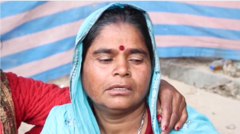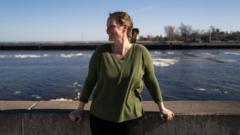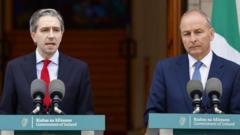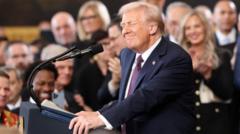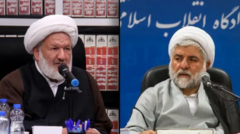Fianna Fáil emerged victorious in the Irish general election, winning the most seats in the Dáil, with coalition talks likely to shape the new government.
Fianna Fáil Takes Command in Ireland's General Election

Fianna Fáil Takes Command in Ireland's General Election
Fianna Fáil secures the majority, igniting coalition talks in Ireland’s recent election.
Fianna Fáil has claimed the top spot in the Dáil after the recent general election in the Republic of Ireland, securing 48 seats, ahead of Sinn Féin which garnered 39 and Fine Gael with 38. This outcome sets the stage for potential coalition talks between these parties, although Sinn Féin remains determined to participate in discussions. A total of 174 seats were contested, with a majority of 88 needed to govern.
Initial results showed Fianna Fáil leading with 21.9% of first-preference votes, followed closely by Fine Gael at 20.8% and Sinn Féin at 19%. Voter turnout was recorded at 59.7%, marking the lowest participation in over a century. Jack Chambers, Fianna Fáil's deputy leader, indicated that while a new government may not be formed before Christmas, he does not foresee a lengthy negotiation period like witnessed previously.
The path forward for Fianna Fáil and Fine Gael in forming a coalition includes options such as allying with the Labour Party or the Social Democrats, who both secured 11 seats, or potentially partnering with the right-wing party Independent Ireland which won 4 seats. Additionally, the coalition could involve several of the 16 independent lawmakers or align with two Aontú TDs or the sole representative from the 100% Redress Party.
As discussions begin, Micheál Martin of Fianna Fáil is positioned as a frontrunner for the next taoiseach. Labour's Marie Sherlock expressed her party's unwillingness to support a government solely comprised of Fianna Fáil and Fine Gael, insisting that smaller parties be included in any negotiations. Meanwhile, Sinn Féin's Eoin Ó Broin affirmed their commitment to engage with other progressive groups, while Chambers emphasized significant policy differences with Sinn Féin.
Fine Gael's new TD Emer Currie celebrated her election as a momentous occasion and interpreted the results as a sign of public satisfaction with the efforts of Fine Gael and Fianna Fáil working in tandem. Social Democrats' deputy leader Cian O'Callaghan hinted at a potential coalition with leftist parties, although the current election results indicate that forming a solely left-wing government isn't feasible.
On the other hand, the Green Party faced a challenging outcome, losing the majority of their seats and keeping only one with their leader Roderick O'Gorman narrowly retaining his position. Political observers noted that despite their diminishing numbers, the party achieved many significant policy wins while in government.
As Ireland embarks on a new political chapter, the coming weeks will be crucial for determining the dynamics of the next government amidst a landscape of complex negotiations and shifting alliances.


